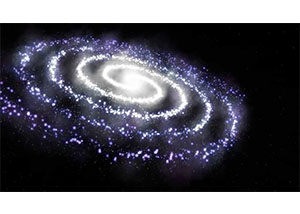A Homily for the Thirteenth Sunday in Ordinary Time, Year A
Have you fitted a curb to the Pleiades, or loosened the bonds of Orion? Can you bring forth the Mazzaroth in their season, or guide the Bear with its train?
–Job 38:31-32–
Jesus said, “Whoever finds his life will lose it, and whoever loses his life for my sake will find it.”
–Matthew 10:39–
Way back in the second century AD, the Egyptian astronomer and mathematician Claudius Ptolemy, like many of his predecessors, believed in a geocentric universe. In other words, he maintained that the earth was the center of all things. In the sixteenth century, however, Polish astronomer Nicolaus Copernicus began a revolution (no pun intended) in science by asserting that the universe was heliocentric, that all things revolved around the sun. Eventually astronomers came to learn that even the sun is not the center of the cosmos but lies at the edge of the Milky Way Galaxy. Today science tells us that the Milky Way Galaxy itself occupies only a peripheral place in the outskirts of the known universe. Furthermore, Proponents of the big-bang theory[1] argue that the entire universe is rapidly expanding outward from its point of origin. It would seem, then, that as astronomy matures, mankind is thrust more and more from center stage. Once we were the centerpiece of the cosmos. Now we are light-years away from the center. This is what Harvard astronomer Robert P. Kirshner has called “cosmic humility.” What is humility? Humility is not self-degradation but a happy acceptance of one’s true place in the great scheme of things.
By way of analogy, the same sort of process ought to take place within each of us as we mature spiritually. The more we make progress in the spiritual life, the more our ego is thrust out from center stage and the more we regard ourselves as mere satellites of God, the One True Center of the Universe. Authentic spirituality recapitulates astronomy. In other words, our spiritual development ought to mirror the history of astronomy.
Consider, for example, the teaching of Saint Bernard of Clairvaux (d. 1153). In his simple yet profound little volume entitled On Loving God, the Cistercian abbot divides the ideal spiritual journey into four distinct stages. First, says Saint Bernard, we love self for self’s sake. Our only motive is that of self-gratification. We do only that which we judge will make us happy. Next, if all goes well, we come to love God for self’s sake. Yes, we do indeed labor for God, but our service is like that of a hired hand. We work primarily for the rewards promised us by our Master. I’ll be good, we say, but all this better pay off in heaven. Gradually, however, we come to love God for God’s sake. Now our desire is simply to please God without any motive of self-interest. I don’t care what happens to me, we pray. I want only to do your will, O God! This, asserts Saint Bernard, is a level of holiness which only the greatest saints are able to achieve in this life. Finally, God willing, we arrive at the Beatific Vision in Heaven, wherein we love self for God’s sake. Our charity is so complete that we love even ourselves disinterestedly. C.S. Lewis describes God’s ultimate aim thus:
He wants each man, in the long run, to be able to recognise all creatures (including himself) as glorious and excellent things. He wants to kill their animal self-love as soon as possible, but it is his long-term policy…to restore to them a new kind of self-love—a charity and gratitude for all selves, including their own; when they have really learned to love their neighbours as themselves, they will be allowed to love themselves as their neighbours .[2]
Thus when God truly occupies the center of our universe, our self-love is rightly intensified. Again, Lewis asserts: “When first things are put first, second things are not suppressed but increased.”[3] That is why we are told in today’s Gospel that whoever loses his life for Christ’s sake will ultimately find it.[4] Saint Bernard sees this fourth stage of spirituality as so completely fulfilling that he believes none of us will attain it until the General Resurrection of the Dead.
To repeat, the ideal spiritual life has four stages: First, we love self for self’s sake. Next, we love God for self’s sake. Then we love God for God’s sake. Finally, we love ourselves for God’s sake. At every step, the ego is thrust more and more outward, and God comes more and more to occupy center stage.
From what has been said thus far, it might at first appear that progress in the spiritual life is anything but pleasant. Who, after all, likes to be upstaged by someone else, even if that Someone happens to be God? Who of us does not enjoy the limelight? Yet, upon reflection, we have to admit that it is no easy task for any of us mere mortals to occupy the central place in the cosmos. Always having to be right, attempting to get others to do our will, regarding even the most trivial slights and misfortunes as cosmic catastrophes—all of this takes quite a bit of energy!
Take it from me. It is very difficult running the universe. I have tried. Better leave that job to God. As Saint Francis de Sales reminds us, He has done it pretty well for all the eons we did not exist,[5] and He will no doubt continue to do the same long after we have left planet earth!
[1] The big-bang theory was first proposed by the Belgian Catholic priest and astronomer, Georges Lemaître, in 1927.
[2] The Screwtape Letters, Letter XIV.
[3] From Letters of C. S. Lewis.
[4] Matthew 10:39.
[5] Introduction to the Devout Life, Part I, Chapter 9.

